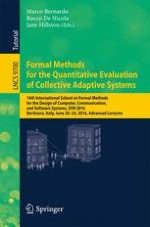2016 | OriginalPaper | Buchkapitel
Modelling and Analysis of Collective Adaptive Systems with CARMA and its Tools
verfasst von : Michele Loreti, Jane Hillston
Erschienen in: Formal Methods for the Quantitative Evaluation of Collective Adaptive Systems
Aktivieren Sie unsere intelligente Suche, um passende Fachinhalte oder Patente zu finden.
Wählen Sie Textabschnitte aus um mit Künstlicher Intelligenz passenden Patente zu finden. powered by
Markieren Sie Textabschnitte, um KI-gestützt weitere passende Inhalte zu finden. powered by
